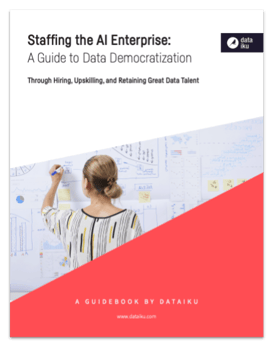There’s a data revolution coming alive at enterprises worldwide with everyone talking about - and racing toward - advances in machine learning, predictive analytics, and artificial intelligence. That means the newest C-suite kid on the block, the Chief Data Officer (CDO), has a lot going on. So amidst all of the action, it’s easy to get pulled in all different directions - but the best among them stay focused in three core areas.

We’ve spent a lot of time in 2018 attending (and hosting - check out one of our recaps here) events, talking to CDOs from around the world in all kinds of industries. And these three focus areas - people, productivity, and to keep with the “p” theme we’ll call it “publicity” - came up again and again. Here’s what they mean and why they matter:
People
The reality of today’s landscape is that finding the right people that will move your data team forward is hard - and, unfortunately, they can be even harder to retain. On top of that, the job of data scientist is still a relatively new discipline and the domain is changing rapidly, so it’s difficult to know what skills to look for.
So finding and keeping the right people is challenging, but it’s also critical. We’re long past the stage where you hire just one person to expertly handle every single part of the data pipeline, so having the right combination of each component - from data analysts to scientists, architects to DataOps (aside: what role does DataOps play anyway?) - will ensure projects don’t get blocked.
When it comes to people, it’s worth noting that technical skills aren’t necessarily everything, either. Communication skills, presentation skills, the ability to explain complex topics to others with a less technical background, the ability to work cross-team: all of these things will help make the next two focus areas - productivity and “publicity” - a slam dunk. So the people that make up the team are hands down the most important component of all three of these focus areas.
Read more about how to hire great data scientists, including what questions to ask, and specifically what to look for.
Productivity
Of course, on any team, being productive is a critical component of success - it seems surprising that teams or departments that are not productive even exist. But unfortunately, one of today’s realities in data science is that data teams spend a lot of time in the sandbox or in a development environment, but these projects might never see the light of day in a production environment with real data, making a real impact on the business.
So for CDOs, the simple concept of having some kind of tangible output is certainly top of mind. But how to ensure productivity? For starters:
- Have a concrete plan in place for putting data science in production - here’s a guidebook that can help.
- Help make everyone more productive and encourage scalability by making sure there isn’t repeated work going on throughout the team - that means having a way to reuse and automate parts of the process as well as having a central repository of active and past data projects for everyone to see and learn from.
Publicity
The last, but certainly not least, focus area for CDOs is “publicity” - but not in the traditional sense of public relations, marketing, etc. Rather, this refers to internal publicity and making sure that others at the company - all levels and roles - know what work is being done, what the results were, how to use data as a resource, and more.

Therefore, publicity isn’t just a selfish push for recognition; in fact, making the data team’s work known serves a much wider purpose. When taking the plunge to become a data-driven organization, it’s critical that everyone at the enterprise is involved so that each department - and even down to the level of each individual - is able to leverage data to drive day-to-day decisions.
Having a data team whose work is well known encourages other teams across the company to approach them with their business problems and builds the kind of collaborative, data-powered environment that allows for cutting-edge innovation. In fact, building up a data team to take on a consultancy role within the company is a great solution.





